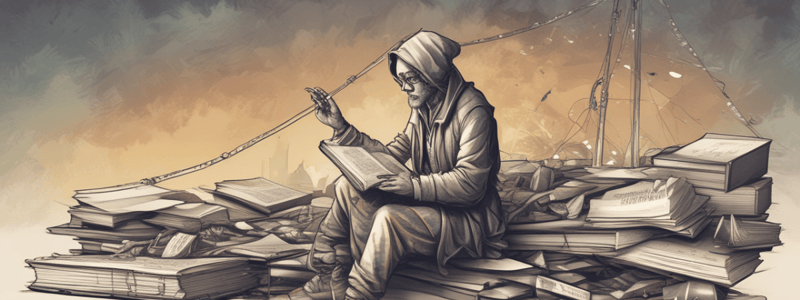Podcast
Questions and Answers
What is plagiarism?
What is plagiarism?
- Requesting permission to use someone else's work
- Passing off someone else's words, ideas, or work as one's own (correct)
- Submitting one's own original work
- Giving credit to someone else's work
Which type of plagiarism involves copying and pasting someone else's work without quotation marks or proper citation?
Which type of plagiarism involves copying and pasting someone else's work without quotation marks or proper citation?
- Mosaic Plagiarism
- Paraphrasing Plagiarism
- Verbatim Plagiarism (correct)
- Idea Plagiarism
What is the consequence of plagiarism in academics?
What is the consequence of plagiarism in academics?
- Suspension or expulsion from an academic institution (correct)
- Automatic pass in a course
- Receiving extra credit
- Increased reputation and credibility
Which of the following is a way to avoid plagiarism?
Which of the following is a way to avoid plagiarism?
What is self-plagiarism?
What is self-plagiarism?
What is the ethical consequence of plagiarism?
What is the ethical consequence of plagiarism?
Flashcards are hidden until you start studying
Study Notes
Definition of Plagiarism
- Plagiarism is the act of passing off someone else's words, ideas, or work as one's own without proper acknowledgement or credit.
- It involves stealing and presenting someone else's intellectual property as one's own.
Types of Plagiarism
- Verbatim Plagiarism: Copying and pasting someone else's work without quotation marks or proper citation.
- Mosaic Plagiarism: Blending copied phrases or sentences with one's own words without proper citation.
- Paraphrasing Plagiarism: Rewording someone else's work without proper citation.
- Idea Plagiarism: Presenting someone else's ideas as one's own without proper citation.
- Self-Plagiarism: Reusing one's own previous work without proper citation or permission.
Consequences of Plagiarism
- Academic Consequences:
- Failure in a course or assignment
- Suspension or expulsion from an academic institution
- Revocation of a degree or academic credential
- Professional Consequences:
- Damage to reputation and credibility
- Legal action, including fines and lawsuits
- Loss of job or career opportunities
- Ethical Consequences:
- Violation of academic integrity
- Unfair advantage over others
- Undermining of original work and creators
How to Avoid Plagiarism
- Proper Citation: Use recognized citation styles (e.g. MLA, APA, Chicago) to credit original sources.
- Paraphrasing: Rewrite information in one's own words, but still provide proper citation.
- Quotation: Use quotation marks to set off copied words or phrases, and provide proper citation.
- Original Work: Conduct original research and create original ideas.
- Seeking Help: Consult with instructors, peers, or academic support services when unsure about plagiarism.
Studying That Suits You
Use AI to generate personalized quizzes and flashcards to suit your learning preferences.




